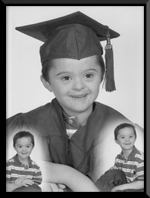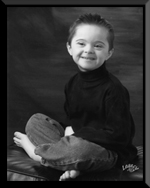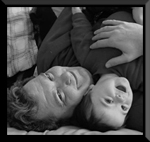
Bernadette and Josh to Wed

Thursday, 10/11/07
Couple with Down syndrome prepare to wed
They expect their love to transcend limitations
By CLAUDIA PINTO
Staff Writer
Doctors referred to Gwenn Resha's baby as a "mongoloid idiot" and advised her to put the infant in a nursery and have another one real quick.
"They said nursery, but they were meaning institution," Resha said. "Back then, there was no expectation that people with Down syndrome would do anything but sit and vegetate."
Resha's daughter, Bernadette, has helped to debunk that once-widespread belief. The 28-year-old has graduated from high school, acted as a paid spokeswoman for Easter Seals and Special Olympics, appeared in the movie Gummo and become an accomplished artist whose paintings sell for hundreds of dollars.
On Nov. 11, she will do something else that experts a generation ago would not have thought possible: she is getting married to a man who also has Down syndrome.
Advocates say marriage is rare between two people with Down syndrome but becoming more common because of longer life spans made possible by medical advancements. Newer laws ensure their right to education and employment, which have made independence possible.
No one tracks the number of such marriages across the country.
"I don't know of any other couple with Down syndrome who have been married in Tennessee," said Sheila Moore, executive director of the Down Syndrome Association of Middle Tennessee.
"This is very exciting for Bernadette and Josh. It's also very exciting for the Down syndrome community. It's gives us hope and excitement that individuals with Down syndrome are having more opportunities and living more normal lives than ever before."
Bernadette Resha of Nashville and her fiancé, Josh Putman, of Mt. Juliet, seem unconcerned about being pioneers. They just want to be together.
"I like Bernadette. I love her like a wife," said Putman, 25. "Every time I met her, her is a good person, a good athlete. And her is a good artist."
Bernadette Resha responded to the kind words with a shy giggle and tenderly touched Putman's arm.
"He is my very close friend, boyfriend," she said. "I like for him to support me and be a good husband."
They had opportunities
Advocates say that Bernadette Resha and Putman are part of the first generation of children with Down syndrome who have had opportunities to be educated and employed.
Instead of living out their lives in an institution, they have been included in public schools. Their individualized education plans typically include employment training and instruction on how to live independently.
"Prior to 1975, it was not mandated for children with Down syndrome to be educated," said Madeleine Will, vice president of public policy for the National Down Syndrome Association.
"It's believed there were 1 million children with Down syndrome and other disabilities who weren't being educated."
In the early 1990s, the Americans with Disabilities Act required that accommodations be made in the workplace when possible, and prohibited discrimination.
As a result, "adults with Down syndrome are achieving more than ever before," Moore said. "They are graduating from high school. They are employed in our community."
In addition, medical advances have dramatically increased the life expectancy of people with Down syndrome. Will said that in the 1980s, whites with Down syndrome typically didn't live to the age of 25. That compares with an average lifespan of 55 today.
Down syndrome, caused by a chromosomal abnormality, comes with a host of medical conditions, including heart and digestive problems.
"Now almost all of these things can be corrected," Moore said.
While progress has been made, advocates say there are still many obstacles that people with Down syndrome face in getting married.
Will said the primary problem is that people with Down syndrome who choose to get married will receive one-quarter less in Supplemental Security Income, a federal program that gives money to people with disabilities who have little or no income.
"Sometimes they just move in together and don't get married because they can't afford it otherwise," Moore said.
Putman and Bernadette Resha will receive $300 less each month in federal benefits. That means their parents will have to provide them with additional financial support. In addition to Bernadette Resha's income as an artist, Putman works part time bagging groceries at a Publix grocery store.
It doesn't seem right to Bernadette's father, Louis Resha. "If you have a disability, you shouldn't be penalized for getting married," he said.
Independence possible
Putman was unaware of the symbolism, but he chose to propose to Bernadette on July 4: Independence Day.
Once the two are married, they will move from their parents' homes and live independently for the first time in their lives in a Nashville apartment.
Putman fondly remembers the day he asked Bernadette to marry him. It was in her parents' kitchen in the middle of a party.
"I got my knee down. I said, 'I love you a lot.' I said, 'Bernadette, will you marry me?' " Putman recalled. "Bernadette said yes. Then Bernadette started crying. Then Bernadette's dad, Louis, started crying. That was a big happy moment."
Putman and Bernadette Resha have been lifelong friends. They met at St. Bernard's preschool when Bernadette Resha was 5 and Putman was 2.
But it wasn't until 1995, when Putman accompanied the family to the Special Olympics' World Gamesin Connecticut, that they "somehow saw each other in a different way," Gwenn Resha said.
"I think their love for each other probably is more sincere than other people because their friendship just kept getting stronger and stronger," she said.
They like to go out to eat, go to the movies, walk in the mall, spend time together — many of the same things other couples like to do.
Like other couples, they are looking forward to getting married and spending their lives together. However, they aren't interested in having children.
"No kids," Bernadette Resha said. "It's real hard to care (for) children. It's a big task."
The two realize it will be hard enough to take care of each other. They are confident they can do it, though.
They know how to clean the house, wash clothes, and do minor cooking. Their parents will regularly check in on them.
"Our responsibility is, grow up. Be a young man and young lady," Putman said. "We together. It's nice together. Sometimes it's good and bad. We work it out."
to view the video go HERE
|


















1 comments:
fabulous post Jan!!!!
Post a Comment